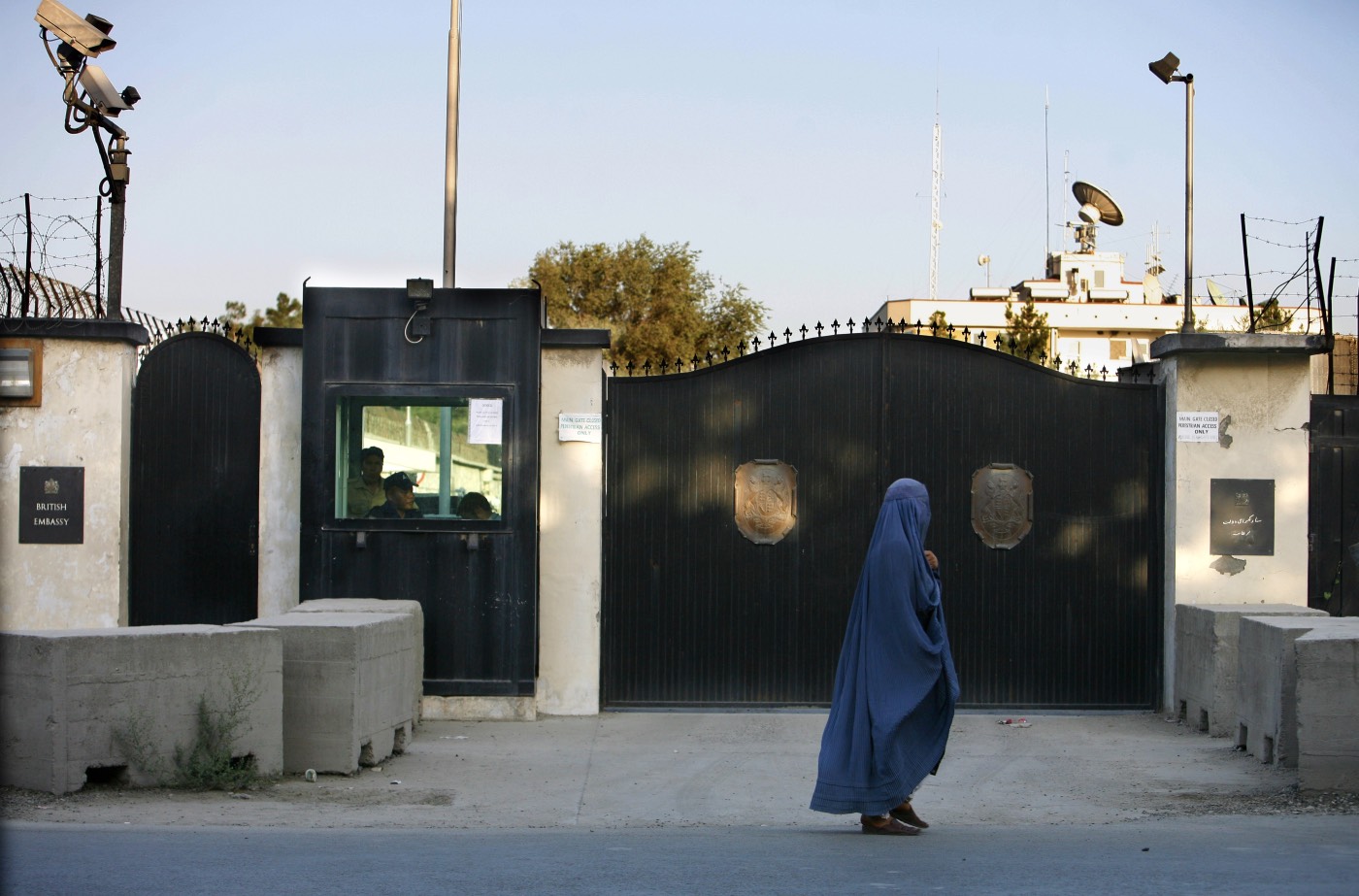British embassy ‘left details’ of local Afghan staff for Taliban to discover
Paperwork identifying employees abandoned by British officials in their retreat

A free daily email with the biggest news stories of the day – and the best features from TheWeek.com
You are now subscribed
Your newsletter sign-up was successful
Foreign Office staff left documents with the contact details of Afghans working for them in the British embassy in Kabul when they left the country before the Taliban’s arrival in the capital, it has emerged.
Anthony Loyd, The Times’s war correspondent, found the papers, which identified seven Afghans, as Taliban fighters patrolled the embassy around him. He spotted the “dusty” sheets of paper “scattered by the ashes of a barbecue in the backyard of a British embassy residency building” as the “militants looked on”.
The embassy’s evacuation procedure requires the shredding and destruction of all data that could compromise local Afghan staff, their families or potential employees. However, this protocol appears not to have been observed in the haste to leave the site as the Taliban closed in.
The Week
Escape your echo chamber. Get the facts behind the news, plus analysis from multiple perspectives.

Sign up for The Week's Free Newsletters
From our morning news briefing to a weekly Good News Newsletter, get the best of The Week delivered directly to your inbox.
From our morning news briefing to a weekly Good News Newsletter, get the best of The Week delivered directly to your inbox.
“Did the young Afghan man, who applied for a job at the embassy this summer, proudly listing his previous experience working for the US military in Helmand on his CV, deserve to have his name, phone number and full address left by the embassy for the Taliban to read?”, asked Loyd.
Although the paper said it handed over details of the missing staff to the Foreign Office, who helped to co-ordinate their evacuation from Kabul, at least two job applicants for positions as interpreters with the British, whose contact details were left in the embassy compound, have not been found.
Some embassy staff were stranded near Kabul airport amid fears that Afghans who worked alongside Western governments could face reprisals from the Taliban. Among them were three Afghan staff and eight family members, including five children.
The Telegraph pointed out that the news comes at a sensitive time, after Foreign Secretary Dominic Raab was criticised for dismissing a request to speak with his Afghan counterpart to discuss the evacuation of interpreters who worked for Britain two days before the fall of Kabul.
A free daily email with the biggest news stories of the day – and the best features from TheWeek.com
The Times said the “fate of Afghans who worked alongside western diplomats and troops, and who may face reprisals after being left behind” has become an “emblem of the West’s retreat from Afghanistan”.
The Foreign Office has insisted that staff had tried to destroy sensitive material before leaving the embassy, with a spokesperson telling Sky News that staff “have worked tirelessly to secure the safety of those who worked for us including getting three families to safety.
“The drawdown of our embassy was done at pace as the situation in Kabul deteriorated. Every effort was made to destroy sensitive material.”
Meanwhile, The Guardian said that a “last-ditch” attempt to evacuate all the British embassy guards on one of the final flights out of Afghanistan has also failed, leaving them “increasingly frightened about their future”.
-
 6 exquisite homes with vast acreage
6 exquisite homes with vast acreageFeature Featuring an off-the-grid contemporary home in New Mexico and lakefront farmhouse in Massachusetts
-
 Film reviews: ‘Wuthering Heights,’ ‘Good Luck, Have Fun, Don’t Die,’ and ‘Sirat’
Film reviews: ‘Wuthering Heights,’ ‘Good Luck, Have Fun, Don’t Die,’ and ‘Sirat’Feature An inconvenient love torments a would-be couple, a gonzo time traveler seeks to save humanity from AI, and a father’s desperate search goes deeply sideways
-
 Political cartoons for February 16
Political cartoons for February 16Cartoons Monday’s political cartoons include President's Day, a valentine from the Epstein files, and more
-
 Epstein files topple law CEO, roil UK government
Epstein files topple law CEO, roil UK governmentSpeed Read Peter Mandelson, Britain’s former ambassador to the US, is caught up in the scandal
-
 Iran and US prepare to meet after skirmishes
Iran and US prepare to meet after skirmishesSpeed Read The incident comes amid heightened tensions in the Middle East
-
 Israel retrieves final hostage’s body from Gaza
Israel retrieves final hostage’s body from GazaSpeed Read The 24-year-old police officer was killed during the initial Hamas attack
-
 China’s Xi targets top general in growing purge
China’s Xi targets top general in growing purgeSpeed Read Zhang Youxia is being investigated over ‘grave violations’ of the law
-
 Panama and Canada are negotiating over a crucial copper mine
Panama and Canada are negotiating over a crucial copper mineIn the Spotlight Panama is set to make a final decision on the mine this summer
-
 Why Greenland’s natural resources are nearly impossible to mine
Why Greenland’s natural resources are nearly impossible to mineThe Explainer The country’s natural landscape makes the task extremely difficult
-
 Iran cuts internet as protests escalate
Iran cuts internet as protests escalateSpeed Reada Government buildings across the country have been set on fire
-
 US nabs ‘shadow’ tanker claimed by Russia
US nabs ‘shadow’ tanker claimed by RussiaSpeed Read The ship was one of two vessels seized by the US military